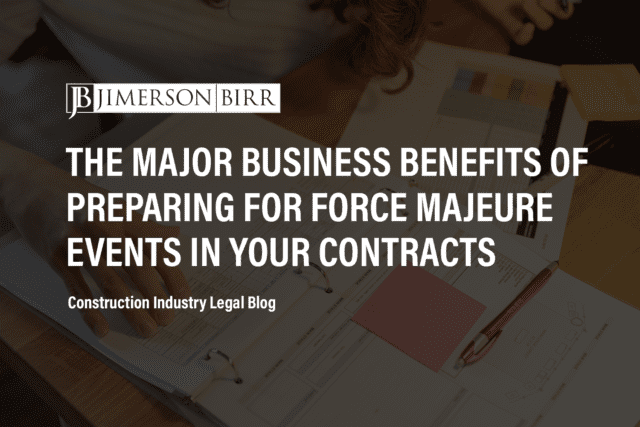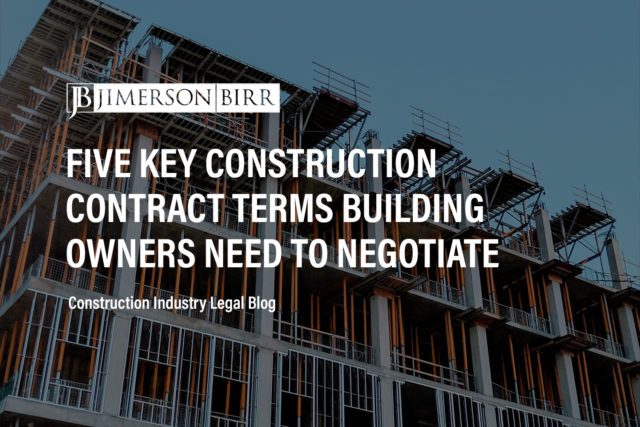How do construction contract review and drafting affect construction companies?
Construction contract review and drafting are fundamental processes that significantly influence the operations of construction companies. These procedures involve the meticulous examination and formulation of contracts that govern construction projects. Through comprehensive review and skillful drafting, construction companies can mitigate risks, clarify responsibilities, and establish clear guidelines for project execution.
In Florida’s dynamic construction landscape, contract review and drafting serve as essential tools for safeguarding the interests of all parties involved. Whether it’s addressing payment terms, project timelines, or dispute resolution mechanisms, well-crafted contracts provide an important foundation for seamless project management. By ensuring alignment with relevant legal frameworks and industry standards, construction companies can navigate complex contractual issues with confidence and clarity.
Need help regarding construction contract review and drafting? Schedule your consultation today with a top construction attorney.
In Florida, which laws and regulations are relevant to construction contract review and drafting?
In Florida, several laws and regulations are relevant to construction contract review and drafting, including:
- The Florida Building Code: Informs construction contract reviewers and drafters of key compliance and contractual considerations, such as construction standards provided for within contracts.
- Limitations on Indemnification: Establish limitations on the enforceability of indemnification clauses in construction contracts.
- Construction Lien Law: Outlines procedures in the event of non-payment for services rendered or materials supplied and provides requirements relevant to ensuring that contractual lien agreements are legally sound.
Additionally, local ordinances and regulations issued by municipalities and counties often serve as important considerations when ensuring that construction contracts are consistent with relevant legal frameworks.
What are common issues regarding construction contacts that lead to litigation?
The following issues are among the most common in actions regarding construction contracts:
- Ambiguous Scope of Work: Failure to clearly define the scope of work in construction contracts can lead to misunderstandings and disputes between parties. Ambiguities regarding project specifications, timelines, and deliverables often result in litigation.
- Unclear Payment Terms: Contracts lacking clarity regarding payment schedules, milestones, and change orders frequently lead to disagreements over financial obligations. Vague language or incomplete provisions related to payment terms can escalate into legal battles.
- Inadequate Risk Allocation: Failure to properly allocate risks among project stakeholders leaves businesses vulnerable to unforeseen challenges. Without explicit provisions addressing liability, insurance coverage, and indemnification, disputes may arise regarding responsibility for project-related issues.
- Non-Compliance with Legal Requirements: Contracts that do not adhere to Florida’s statutory requirements or fail to incorporate essential legal clauses increase the likelihood of litigation. Ignoring regulatory mandates or overlooking mandatory disclosures can expose businesses to significant legal consequences.
- Poorly Drafted Dispute Resolution Mechanisms: Contracts lacking robust dispute resolution mechanisms, such as mediation or arbitration clauses, often result in prolonged litigation processes. Inadequate provisions for resolving conflicts efficiently contribute to escalating legal costs and project delays.
We are value-based attorneys at Jimerson Birr, which means we look at each action with our clients from the point of view of costs and benefits while reducing liability. Then, based on our client’s objectives, we chart a path to seek appropriate remedies.
To determine whether your unique situation may necessitate litigation, please contact our office to set up your initial consultation.
What steps should businesses take to minimize the risk of litigation over construction contracts?
To minimize the risk of litigation over construction contracts, businesses can implement the following strategies:
- Clearly Define Scope and Deliverables: Establish a comprehensive scope of work that delineates project objectives, timelines, and performance expectations. Clarity in contractual language reduces ambiguity and mitigates the risk of misunderstandings.
- Negotiate Fair and Equitable Terms: Prioritize fairness and equity in contractual negotiations to foster positive relationships among project stakeholders. Transparent discussions regarding payment terms, change orders, and dispute resolution mechanisms promote mutual understanding and cooperation.
- Implement Robust Risk Management Strategies: Identify and address potential risks proactively by incorporating risk allocation provisions and insurance requirements into contracts. Clear delineation of responsibilities and liabilities minimizes exposure to legal disputes and financial liabilities.
- Maintain Accurate Documentation: Maintain meticulous records of all contract-related communications, modifications, and approvals throughout the project lifecycle. Comprehensive documentation serves as crucial evidence in resolving disputes and defending against litigation.
- Regularly Review and Update Contracts: Periodically review and update contracts to reflect changes in project scope, regulations, or industry best practices. Proactive contract management ensures continued effectiveness in mitigating legal risks.
- Engage Legal Counsel: Collaborate with experienced construction attorneys to draft and review contracts thoroughly. Legal experts can ensure compliance with relevant statutes, regulations, and industry standards, minimizing the potential for disputes.
Frequently Asked Questions
Can verbal agreements be legally binding?
While some agreements must be in writing, verbal agreements can often be legally binding. However, verbal agreements often lack the clarity and enforceability of written contracts. To avoid disputes and ensure legal protection, it is advisable to document all agreements in writing to establish clear expectations and mitigate potential risks.
What is the significance of indemnification clauses in construction contracts?
Within legal parameters, indemnification clauses in construction contracts can allocate responsibility for losses, damages, or liabilities arising from specified events or actions. These clauses protect parties from financial consequences resulting from third-party claims, disputes, or legal actions related to the project. Careful negotiation and drafting of indemnification provisions are essential to clarify each party’s obligations and minimize exposure to liability.
How can businesses navigate subcontractor disputes in construction contracts?
Businesses can navigate subcontractor disputes in construction contracts by implementing clear communication channels, dispute resolution mechanisms, and escalation procedures. Proactive management of subcontractor relationships, including regular performance evaluations and contract compliance audits, can help prevent disputes and promote constructive resolutions when conflicts arise.
Have more questions about a situation related to construction contract review and drafting?
Crucially, this overview of construction contract review and drafting does not begin to cover all the laws implicated by this issue or the factors that may compel the application of such laws. Every case is unique, and the laws can produce different outcomes depending on the individual circumstances.
Jimerson Birr attorneys guide our clients to help make informed decisions while ensuring their rights are respected and protected. Our lawyers are highly trained and experienced in the nuances of the law, so they can accurately interpret statutes and case law and holistically prepare individuals or companies for their legal endeavors. Through this intense personal investment and advocacy, our lawyers will help resolve the issue’s complicated legal problems efficiently and effectively.
Having a Jimerson Birr attorney on your side means securing a team of seasoned, multi-dimensional, cross-functional legal professionals. Whether it is a transaction, an operational issue, a regulatory challenge, or a contested legal predicament that may require court intervention, we remain tireless advocates at every step. Being a value-added law firm means putting the client at the forefront of everything we do. We use our experience to help our clients navigate even the most complex problems and come out the other side triumphant.
If you want to understand your case, the merits of your claim or defense, potential monetary awards, or the amount of exposure you face, you should speak with a qualified Jimerson Birr lawyer. Our experienced team of attorneys is here to help. Call Jimerson Birr at (904) 389-0050 or use the contact form to schedule a consultation.

We live by our 7 Superior Service Commitments
- Conferring Client-Defined Value
- Efficient and Cost-Effective
- Accessibility
- Delivering an Experience While Delivering Results
- Meaningful and Enduring Partnership
- Exceptional Communication Based Upon Listening
- Accountability to Goals











